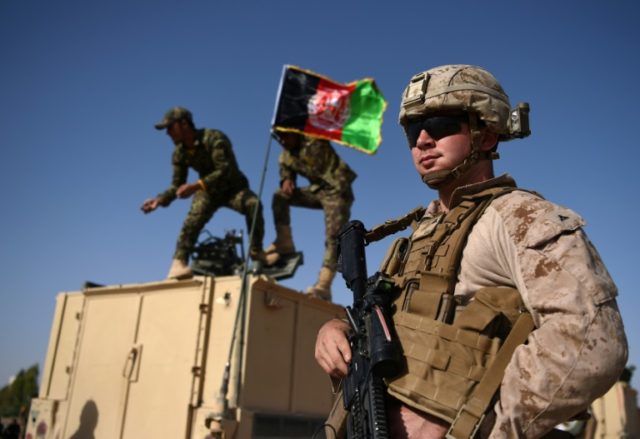Afghan Taliban narco-jihadis this week reportedly repudiated a proposal by U.S. President Donald Trump’s administration that would lead to the complete withdrawal of American forces within three to five years, posing a significant impediment to ongoing peace-seeking negotiations aimed at ending America’s most protracted foreign military engagement.
“The rebel group wants foreign troops to leave the country within a year, according to two former Taliban leaders,” Bloomberg reported on Tuesday.
Several polls show that the war-weary public in America wants to bring U.S. troops home from Afghanistan.
As part of the latest round of negotiations that began last week between the Taliban and the Trump administration, the Pentagon offered to pull out American troops over the next three to five years under a plan that could lead to a government in Kabul that shares power with the terrorist group, the New York Times reported.
The timeline will give the U.S. “a justification to show to the world they weren’t defeated like the Soviets and suddenly left Afghanistan,” Sayed Akbar Agha, a former Taliban leader, who has been in touch with the terrorist group’s negotiators, told Bloomberg, revealing that the jihadis rejected the proposal.
Maulavi Qalamuddin, another ex-Taliban leader, reportedly “echoed Agha’s comments.”
Both former Taliban jihadis predicted that the ongoing negotiations may yield an agreement this week.
Acknowledging that a military victory is unattainable, the Trump administration has made the negotiated reconciliation between Kabul and the Taliban the top goal of its strategy to end the war — raging since October 2001.
Trump administration officials have intensified peace-seeking efforts in recent months. The ongoing discussions in Qatar mark the fourth meeting between negotiators.
During the ongoing round of talks, U.S. and Taliban negotiators are mainly trying to flesh out the framework for a deal agreed to “in principle” last month.
Under that framework, the U.S. would withdraw troops from Afghanistan in exchange for Taliban assurances that Afghanistan will not harbor international terrorists, including its ally al-Qaeda and rival the Islamic State (ISIS/ISIL).
The U.S. has also demanded a ceasefire and the inclusion of the Afghan government in negotiations, to no avail.
President Trump and members of his administration plan to leave behind a residual force to ensure the jihadi group keeps its promises, a proposal that the Taliban also rejects.
“I don’t trust them just as a matter of faith… There’s no blind trust in the Taliban in this administration,” U.S. National Security Adviser John Bolton proclaimed recently.
Despite U.S. insistence that the peace process is led and owned by the Afghan government, negotiations have so far excluded Kabul at the behest of the terrorist group,
Taliban jihadis claim they will talk to Kabul after they reach a pact with the United States.
“Once they reach [an] agreement, the Taliban will announce [a] ceasefire and start talking to the Afghan government to discuss the future of a sharing government, the freedom of Taliban prisoners and removal of their names from the United Nations and U.S. blacklists,” Agha told Bloomberg.
Despite being removed from office by U.S. troops in late 2001, the Taliban considers itself the only legitimate government of Afghanistan, dismissing Kabul as a U.S. “puppet.”
The group is fighting to implement strict Islamic laws or sharia, prompting concern for Afghan women’s rights.
Trump administration officials have come out in support of Kabul’s offer to the Taliban of official recognition as a legitimate political force, effectively granting the group the opportunity to return to power.
After the previous U.S. administration withdrew most of the American troops and declared the combat mission over at the end of 2014, the Taliban gained control of more territory than during any other time since the United States removed it from office.
Now, the Taliban controls or contests more than 45 percent of the districts in Afghanistan, according to a watchdog agency.
Taliban jihadis generate most of their funding from trafficking and cultivating opium, the main ingredient of Afghan heroin — some of which is partly fueling the unprecedented number of drug overdose deaths that have lowered the mortality rate in the United States.
Breitbart News learned that it remains unclear whether or not the U.S. will push the Taliban to stop producing and cultivating opium as part of the peace deal.
Amid the negotiations, the Trump administration has ended its airstrike campaign against the Taliban’s revenue engine — opium and heroin.
Taliban jihadis have intensified their attacks during the talks, killing scores of Afghan security forces and civilians during the ongoing peace talks.
Responding to a recent attack in opium-rich Helmand province, Col. Dave Butler, a spokesman for the U.S. forces in Afghanistan reportedly declared:
They [Taliban] claim they continue their violence to avenge the deaths of innocents when they are the ones killing the Afghan people. I don’t know who they think believes these lies, I do know their energy would be more productive if directed towards seizing a historic opportunity for peace.
According to the United Nations, the Taliban and their improvised explosive devices (IEDs) or homemade bombs are the top drivers behind the unprecedented 3,804 civilian deaths in 2018, including a historic number of children.
The United States has devoted a tremendous amount of blood and treasure to the fight in Afghanistan — nearly $1 trillion or about $3 billion per month, 2,278 U.S. military deaths, and 20,431 injuries.
Most of the U.S. military casualties in Afghanistan took place under former President Barack Obama.

COMMENTS
Please let us know if you're having issues with commenting.